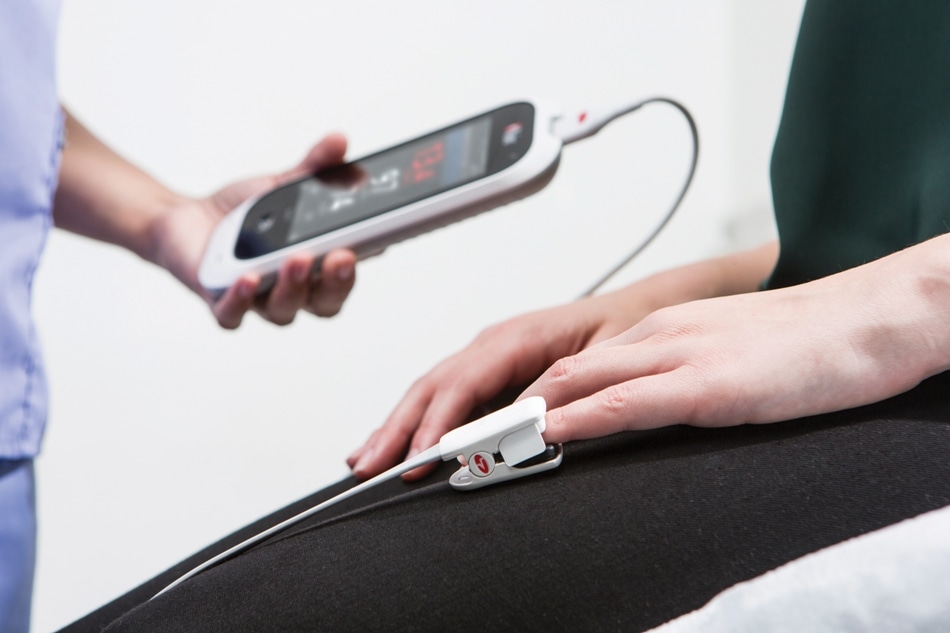Masimo announced today the CE marking of the rainbow® Super DCI®-mini sensor, a reusable spot-check sensor that features Masimo SET® Measure-through Motion and Low Perfusion™ pulse oximetry and rainbow SET™ technology with multiple physiologic measurements – including, for the first time, the ability to measure total hemoblogin (SpHb®), carboxyhemoglobin (SpCO®), methemoglobin (SpMet®), and arterial oxygen saturation (SpO2) using the same noninvasive reusable sensor.
 Masimo Rad-67™ Pulse CO-Oximeter® with rainbow® Super DCI®-mini Sensor (Credit: Business Wire)
Masimo Rad-67™ Pulse CO-Oximeter® with rainbow® Super DCI®-mini Sensor (Credit: Business Wire)
In 2016, Masimo introduced the rainbow® DCI-mini sensor, enabling spot-check measurement of Next Generation SpHb and other parameters. Now, with the rainbow® Super DCI-mini sensor, an expanded set of parameters can be measured using a single sensor: SpO2, pulse rate (PR), perfusion index (Pi), pleth variability index (PVi®), SpHb, SpCO, and SpMet.
The rainbow® Super DCI-mini sensor can be used to spot-check all patients weighing 3 kg or more, further reducing the need for multiple sensor types; the sensor can be applied to an adult finger, a pediatric finger, or an infant finger, thumb, or great toe. The sensor is small and lightweight, with a flexible cable to provide sensor stability and patient comfort during monitoring.
Next Generation SpHb technology offers motion tolerance and a faster time to display SpHb results (in as few as 30 seconds). In addition, field performance has been enhanced in lower hemoglobin ranges. Next Generation SpHb is enabled when the Rad-67™ Pulse CO-Oximeter® and the DCI-mini or Super DCI-mini sensor are used together.
SpCO monitoring may lead to the identification of elevated carbon monoxide levels that might otherwise go undetected in front-line settings, such as triage and emergency care. SpMet helps clinicians monitor for methemoglobin in care areas where the drugs that cause methemoglobinemia are most common, such as procedure labs and the operating room.
Joe Kiani, Founder and CEO of Masimo, said, "This is an exciting day for us and hopefully a great opportunity to improve patient care. Since the invention of rainbow® technology, we have been wanting our customers to be able to measure SpCO, SpMet, SpHb and SpO2 simultaneously. Now they can! In addition, we have been pursuing a spot-check sensor that fits all patients across the age spectrum. We believe the rainbow® Super DCI-mini sensor will be especially valuable for use in triage and emergency care situations. We plan to introduce a continuous measurement version of the Super Sensor in the near future."
The rainbow® Super DCI-mini sensor, Next Generation SpHb, and Rad-67 have not received FDA 510(k) clearance and are not available for sale in the United States.